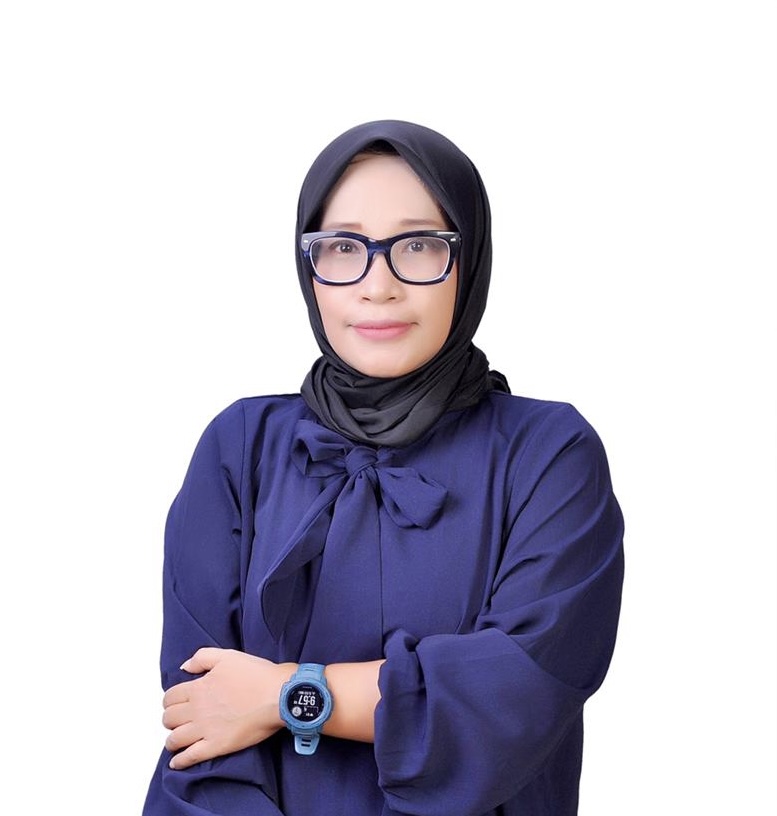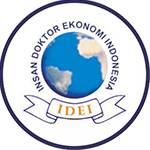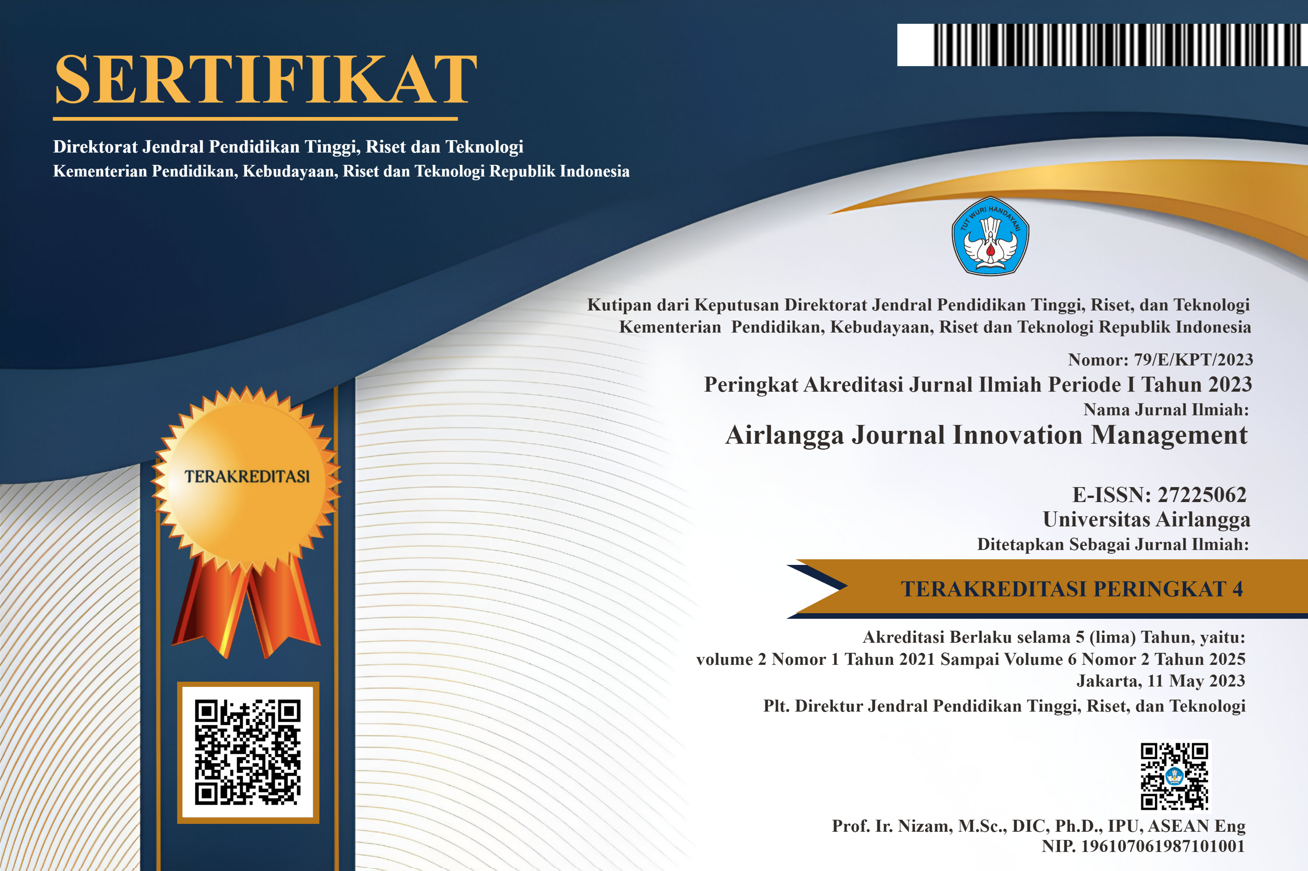The Impacts of Coaching on Innovative Food Business Performance: A Study of Indonesian Entrepreneurship Development Program
Downloads
Business coaching has emerged as a prominent tool for enhancing organizational performance and individual development. Relying on the Goal-setting theory, this article uses qualitative method to provide an empirical study about the impacts of the GROW (Goals, Reality, Options, and Will) model of business coaching on product development, managerial improvement, and fulfilment of legal aspects on top of financial aspects for Indonesian micro and small food businesses. The study was conducted based on the results of the Indonesian Food Innovation (IFI) coaching program; an entrepreneurship development activity initiated by the Indonesian Ministry of Industry. The data in this study was gathered from the tracery study carried out by the IFI committee. Conducting an experiment method using comparative of pre- and post-activities, this research compares the participants’ business performance before vs. after coaching intervention, this study finds evidence of the significant positive impacts of business coaching on enhancing business performance, such as sales value and business valuation. The success of an entrepreneurship development program is determined by the insight into vital issues that are specifically often faced in a particular industry. Therefore, entrepreneurship development programs need to be customized according to the industry.
Fauziana, H., Wardhana, A. K., & Rusgianto, S. (2022). The Effect of Education, Income, Unemployment, and Poverty toward the Gini Ratio in Member of OIC Countries. Daengku: Journal of Humanities and Social Sciences Innovation, 2(2), 181–191.
Febriyanti, A. R., Ratnasari, R. T., & Wardhana, A. K. (2022). The Effect of Economic Growth, Agricultural Land, and Trade Openness Moderated By Population Density on Deforestation in OIC Countries. Quantitative Economics and Management Studies, 3(2).
Gehring, K. B., & Kirkpatrick, R. (2020). Hazard analysis and critical control points (HACCP). Food Safety Engineering, 191–204.
Ghifara, A. S., Iman, A. N., Wardhana, A. K., Rusgianto, S., & Ratnasari, R. T. (2022). The Effect of Economic Growth, Government Spending, and Human Development Index toward Inequality of Income Distribution in the Metropolitan Cities in Indonesia. Daengku: Journal of Humanities and Social Sciences Innovation, 2(4), 529–536.
Haneef, M. A., Pramanik, A. H., Mohammed, M. O., Fouad, M., & Muhammad, A. D. (2015). Integration of waqf-Islamic microfinance model for poverty reduction The case of Bangladesh. International Journal of Islamic and Middle Eastern Finance and Management, 8(2), 264–270. https://doi.org/10.1108/mf.2008.00934jaa.001
Herianingrum, S., Alan Nur, M., Rusgianto, S., Hapsari, M. I., Huseyin, E., Firmansyah, F., & Febriyanti, A. R. (2024). Gravity model of trade approach: what drives Indonesia’s seafood export and its halal market potency in OIC (Organization of Islamic Cooperation) countries. Journal of Islamic Marketing, 15(8), 2016–2035. https://doi.org/10.1108/JIMA-07-2023-0226
Iman, A. N., Wardhana, A. K., Rusgianto, S., & Ratnasari, R. T. (2022). Venture vs Investment, Which Type of Financing was more Demanded by Agriculture, Forestry, and Aquaculture Sector? Daengku: Journal of Humanities and Social Sciences Innovation, 2(5), 587–595.
Juliansyah, A. F., Putri, A. E., Suryadana, M. L., Endyana, C., & Wardhana, A. K. (2021). Global Muslim Response to Bandung Halal Tourism Branding. International Journal of Applied Sciences in Tourism and Events, 5(2), 197–206. https://doi.org/https://doi.org/https://doi.org/10.31940/ijaste.v5i2.197-206
Loestefani, V., Poan, R., Suwitorahardjo, B., & Wardhana, A. K. (2022). Service Quality and Product Quality as An Influence on Customer Loyalty at Naturalis Koffie. FIRM Journal of Management Studies, 7(2), 211–236.
Mafruchati, M., Musta’ina, S., & Wardhana, A. K. (2024). Research trends of Moringa oleifera Lam as Remedy toward Cattle’s embryo according to the frequently used words in content of papers and citations. Heliyon, 10(11).
Mendo, A. Y., Singh, S. K., Yantu, I., Hinelo, R., Bokingo, A. H., Dungga, E. F., Juanna, A., Wardhana, A. K., Niroula, B., & Win, T. (2023). Entrepreneurial leadership and global management of COVID-19: A bibliometric study. F1000Research, 12(31), 31.
Muhaimin, H., Herachwati, N., Hadi, C., Wihara, D. S., & Wardhana, A. K. (2023). Entrepreneurship Leadership: Fostering An Entrepreneurial Spirit In Students During Pandemic Covid-19 (Case Study In Tebuireng Boarding School East Java). Journal of Namibian Studies: History Politics Culture, 33, 5597–5610.
Putri, G. D., Purwidianti, W., Innayah, M. N., & Alfalisyado. (2023). Investment Decisions: Are Financial Knowledge, Risk Tolerance and Experience Important? South Asian Journal of Social Studies and Economics, 20(4), 250–260. https://doi.org/10.9734/sajsse/2023/v20i4756
Qosim, N., Ratnasari, R. T., Wardhana, A. K., Fauziana, H., & Barkah, T. T. (2023). Eight Years of Research Related to the Green Sukuk in the Global Stock Exchange Market to Support the Implementation of SDG: A Bibliometric Review. Journal of Islamic Economic and Business Research, 3(2), 161–180.
Ryandono, M. N. H., Kusuma, A., Maryani, A., & Wijayanti, I. (2022). Factors influence online donation during COVID-19 pandemic. Al-Uqud: Journal of Islamic Economics, 6(1), 66–83.
Ryandono, M. N. H., Mawardi, I., Rani, L. N., Widiastuti, T., Ratnasari, R. T., & Wardhana, A. K. (2022). Trends of research topics related to Halal meat as a commodity between Scopus and Web of Science: A systematic review. F1000Research, 11(1562), 1562.
Ryandono, M. N. H., Permatasari, S. A., & Wijayanti, I. (2019). Business behavior in an islamic perspective: Case study of muslim woman entrepreneurs in Ikatan Wanita Pengusaha Indonesia (IWAPI). 12th International Conference on Business and Management Research (ICBMR 2018), 154–159.
Santoso, T. B., & Kusuma, A. (2023). The Development of the Usage of Blockchain for Waqf and Zakat Globally: A Bibliometric Study. International Journal of Mechanical Computational and Manufacturing Research, 13(3), 83–91.
Sidaoui, M., Ben Bouheni, F., Arslankhuyag, Z., & Mian, S. (2022). Fintech and Islamic banking growth: new evidence. Journal of Risk Finance, 23(5), 535–557. https://doi.org/10.1108/JRF-03-2022-0049
Wardhana, A. K. (2021). THE IMPACT OF THE PRO AND CONS POLICIES IN JOKOWI ERA’S ON THE MACRO ECONOMY OF SOCIETY. Jurnal Ekonomi Dan Bisnis Airlangga, 31(2), 124–136. https://doi.org/https://doi.org/10.20473/jeba.V31I22021.124-136
Wardhana, A. K. (2022). JANJI (WA’AD) SEBAGAI JARING PENGAMAN PADA TRANSAKSI KEUANGAN DAN BISNIS SYARIAH. Jurnal Keislaman, 5(1), 124–132. https://doi.org/https://doi.org/10.54298/jk.v5i1.3412
Wardhana, A. K., & Ratnasari, R. T. (2022). Impact of Agricultural Land and the Output of Agricultural Products Moderated with Internet Users toward the Total export of Agricultural Product in Three Islamic South East Asian Countries. Iqtishodia: Jurnal Ekonomi Syariah, 7(2), 11–20.
Wijayanti, I. (n.d.). Analisis Penerapan Qawaid Fiqiyyah Terhadap Kebijakan Belanja Pegawai Pemerintah Dalam Pelaksanaan APBN Di Indonesia. BOOK-5: EKONOMI ISLAM, 941.
Wijayanti, I., & Ryandono, M. N. H. (2020). Zakat institutions’ mustahiq transformation in developing countries: Comparison study. Opcion, 36(S26), 350–366.
Yudha, A. T. R. C., Huda, N., Maksum, M., Sherawali, S., & Wijayanti, I. (2024). The Moderating Effect of Religiosity on Fashion Uniqueness and Consciousness in Halal Fashion Purchase. Indonesian Journal of Halal Research, 6(2), 71–84.
Zaki, I., Herianingrum, S., Hapsari, M. I., Bayuny, A. F. R., & Wijayanti, I. (2024). Diversifikasi Pengolahan Frozen Nugget, Pengemasan dan Pemasaran Google Bisnis. JILPI: Jurnal Ilmiah Pengabdian Dan Inovasi, 2(3), 1–10.
Zakik, Z., Kamil, A., Prasetyo, A. S., Ryandono, M. N. H., & Wijayanti, I. (2022). Economic development on Madura Island through halal tourism: A business feasibility study. Al-Uqud: Journal of Islamic Economics, 6(2), 289–303.
Copyright (c) 2024 Airlangga Journal of Innovation Management

This work is licensed under a Creative Commons Attribution-NonCommercial-ShareAlike 4.0 International License.
- The journal allows authors to hold copyright without restrictions and retain publication rights without restrictions. The author retains the copyright and grants the first publication rights to the journal, with his work simultaneously licensed under the Creative Commons Attribution-NonCommercial-ShareAlike 4.0 International License (CC BY-NC-SA). This license allows others to share the work with acknowledgment of authorship and initial publication in this journal, provided that the work is not used for commercial purposes and that any derivative works must use the same license.
- Authors may enter into additional contractual agreements for non-exclusive distribution of the journal publication version (e.g., uploading it to an institutional repository or publishing it in book form), while still including acknowledgment of the initial publication in this journal.
- Authors are allowed and encouraged to upload their work online (e.g., in an institutional repository or personal website) before and during the submission process. This can support productive scientific exchanges as well as increase citations to published works.

AJIM by UNAIR is licensed under a Creative Commons Attribution-NonCommercial-ShareAlike 4.0 International License.





















